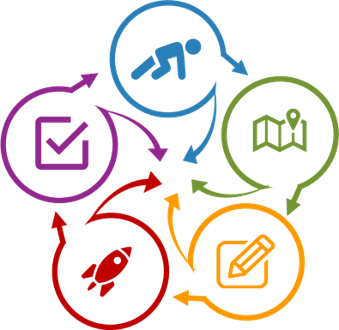Unit A – Teaching & Learning Theories

This unit defines learning and reviews some basic theories of learning. The term ‘theory’ is confusing because many educational theories are nested, meaning that a major theory (referred to here as a learning philosophy), such as cognitivism, has theories that fit within it, such as the theory of cognitive load. And, of course, some theories fit within multiple philosophies. And theories impact each other: for example, Cognitive Load, Margin, and Motivation influence each other. Because these are very complex and overlapping, this workbook provides short descriptions, usually focusing on one of the theories in a topic. For example, although there are many theories on motivation, including at least five specifically on educational motivation, only one is presented here.
Learning vs Teaching
Learning is long-term retention, adding skills, attitudes, and knowledge (SKAs) to schema. Some teaching approaches focus on the transmission of information, often through lectures. However, research has shown that this is frequently ineffective – many students are not really learning or are not learning what is needed. To support student learning, you can use a variety and combination of theories. This is frequently referred to as a student-centered approach as opposed to teacher-centered (from sage on the stage to guide on the side).
Educational theories range from how students learn in general (these theories are referred to here as learning philosophies) to theories on specific aspects of learning, such as motivation, learning preferences, memory, brain functioning, epistemology, and group functioning.
Chapters included in Unit A:
| Chapter Title | Overview | |
| A1 | Learning Philosophies | Basic approach to teaching & learning |
| A2 | Schemas & Threshold Concepts | Mental frameworks and change |
| A3 | Active and Transformative Learning | Major paradigm shifts |
| A4 | Metacognition | How we think about thinking |
| A5 | Transformative Inclusivity & Diversity | Learning goals around inclusivity |
| A6 | Taxonomies/Domains | Categories and levels of learning |
| A7 | Student Epistemological Growth | Student concepts of knowing and knowledge |
| A8 | Cognitive Load | Managing overload & memory |
| A9 | Student Competency | Scaffolding learning and the stages of competency |
| A10 | Motivation | Theory on strategies for motivating students |
| A11 | Load, Power, and Margin | Person’s capacity for managing responsibilities |
